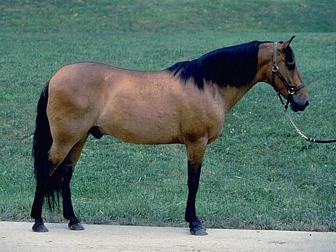
OVERVIEW
The origin of this North African horse is subject to debate. Some claim it might be the ancestor of ancient horses spared from the Ice Age. Others claim the horse is the result of man bringing it to this harsh climate. Whatever the case, the Barb is second only to the Arabian as being one of the world's modern foundation breeds. With the Moorish invasion of Spain came an influx of these North African horses. Later, they were sought out by breeders in France for their stamina and strength (where they were partially responsible for the medieval riding horse, the Limousin), and breeders in England for their speed (where they were influential in creating the Thoroughbred).
PHYSICAL DESCRIPTION
The Moroccan Barb averages in the range of 14.2 to 15.2 hands high. Although the original colorations were bay, dark bay, and black, these have for the most part been replaced by gray because of Arabian influence. The head is narrow with a convex profile, the neck is arched and the withers pronounced. The thick body is indicative of its staying power, although its thin legs are not. Many consider the Moroccan Barb to be lacking in physical presence, but it makes up for this by its great stamina and agility.
ORIGIN
The exact origins of the Barb will probably never be known. Genetic tests have more closely linked it with the French Heavy breeds than with other desert breeds. Some say the unremarkable physical characteristics of the horse are a direct result of the ancient prehistoric North African breeds. Some, on the other hand, say the horse is the sole creation of man: an amalgamation of bloodlines caused by thousands of years of conquest in North Africa, from the Carthaginians to the spread of Islam. Whatever the case, the Barb has a strong influx of Arabian blood, although this is not evident in its physical appearance. Today, Barb purebreds are not very common, though they do exist. Throughout Algeria, Morocco, and Tunisia Barbs are still found and, when cross-bred with Arabians, made into good saddle horses.
INTERESTING FACTS
The great stamina of the Barb is exemplified by the influence it has had on many of the great Spanish horses, themselves known for hardiness. Born in the desert climates of North Africa, the horse was ridden by Berber horsemen and as such had a great effect on the Muslim Conquest of the Iberian Peninsula. The horse's agility and toughness shows in its many influenced breeds: the Thoroughbred, the Connemara Pony, and the Criollo to name just a few.
INFLUENCES
One of the Founding Breeds
For more information:
Ministry of Agriculture
Et De La Reforme Agraire
Kingdom of Morocco